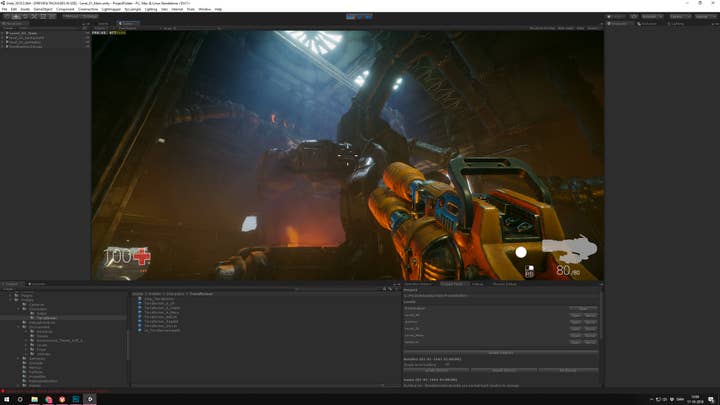Unity dabbles in development with FPS Sample Game
VP of engineering Brett Bibby says undertaking will demonstrate the "best way to build a specific type of game"
After years of creating and supporting one of the most popular game development engines and asset stores, Unity is at last taking a dive into game development itself. At Unite LA this evening, Unity has announced the release of its "FPS Sample Game," a full, free game intended as a "starting point" for developers, as well as an insight for Unity into its own platform.
The project is being made available to Unity developers for free at of the conclusion of its reveal at Unite LA. It will be both a a fully playable vertical slice of a game, and as a development base complete with code and assets that Unity users can take apart or build upon for themselves.
According to Unity Technologies VP of engineering Brett Bibby, one goal of Unity's FPS sample is to speed up development for those working with FPS games in the engine by giving them a scaffolding to build on top of.
"Unity is such a flexible platform that there are many ways to approach a project," he said. "Our goal is to provide a production quality starting point that's opinionated on the best way to build a specific type of game. Our first one, the Sample FPS Game, is a complete project that creators can learn from and even use as a base for their own projects."
Another, complimentary goal is to give Unity insight into the weaknesses of its own platform - places where developers might struggle that the engine's creators might otherwise be unaware of.
"Leveraging internal developers to build production content provides useful context along with the feedback we get from users," Bibby said. "The result is that we're solving a significant number of pain points while working with content. As projects get larger and more complex, maintaining scalability is key. We have been working hard to make sure Unity scales to the largest projects."

Though the FPS sample game is a fully functional release today, this isn't the end of its development, nor is it the end of similar projects. Bibby says Unity will continue to communicate with the developer community to improve the project and Unity itself based on feedback, and will also move into other genres for future, similar samples. The FPS genre, he says, was a good place to start as it is a good overview of commonly needed gameplay functions for the Unity audience.
Bibby was careful to emphasize that this is a tool for developers, and for Unity itself - Unity doesn't intend to sell a game or compete with its customers. And yet, even for the company with all the tools at its disposal, developing a functional game (and continuing to develop further over time) takes considerable resources. Bibby says there's plenty in it for Unity, though.
"It focuses us on the most critical issues our users face and helps us prioritize areas with the most need of improvement," Bibby said. "Another benefit is giving users an alternative way to learn about the features of Unity rather than just reading the manual. Some users will find tools or ideas not specific to the FPS genre that they can extract and use in their own projects. Some will simply go here to double-check their understanding of a certain feature.
"Finally, having an always-up-to-date and realistically scoped project which can be used to test new features is very useful. This goes both for profiling for performance, testing workflows, and verifying that new API's feel right when used by game code. Also, it provides a 'horizontal' QA view of the engine, because you can't cover everything with unit tests. Trying out new releases of Unity on a game project that we know really well is a good way to spot problems before release."
